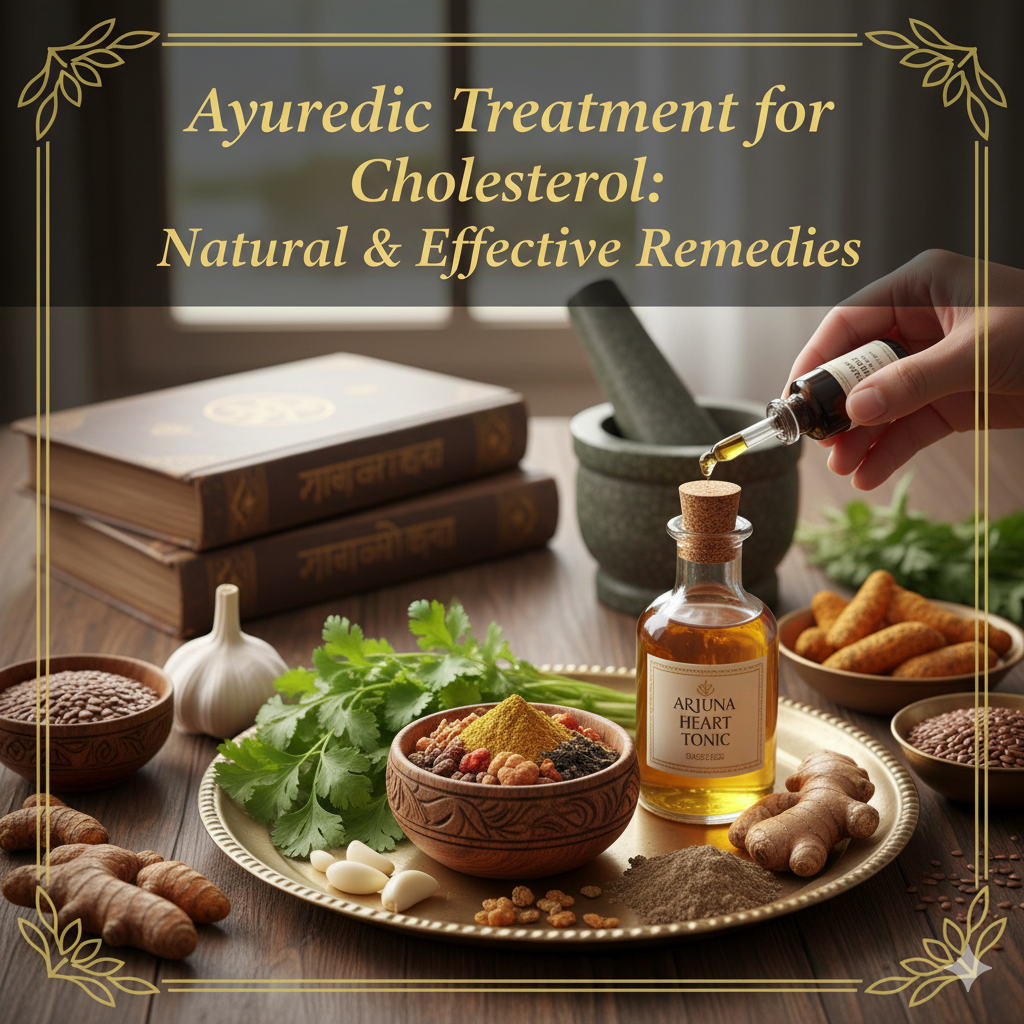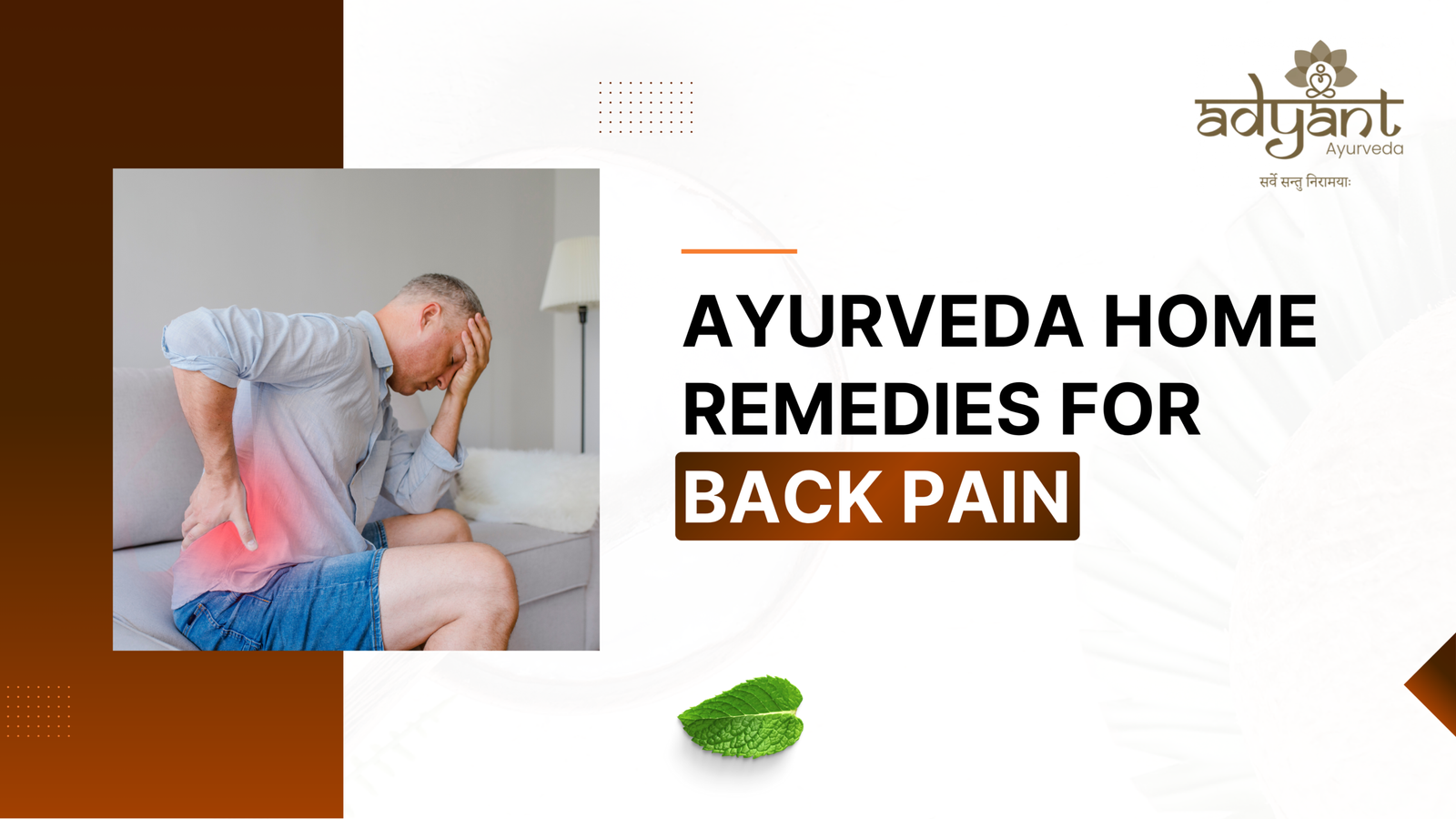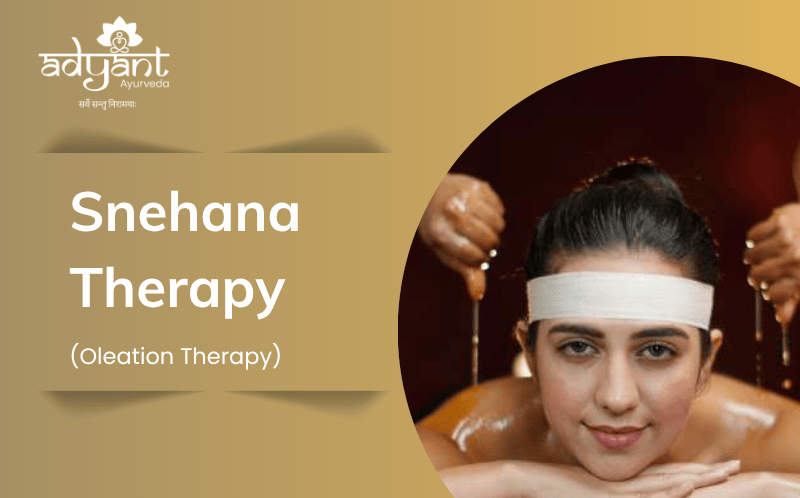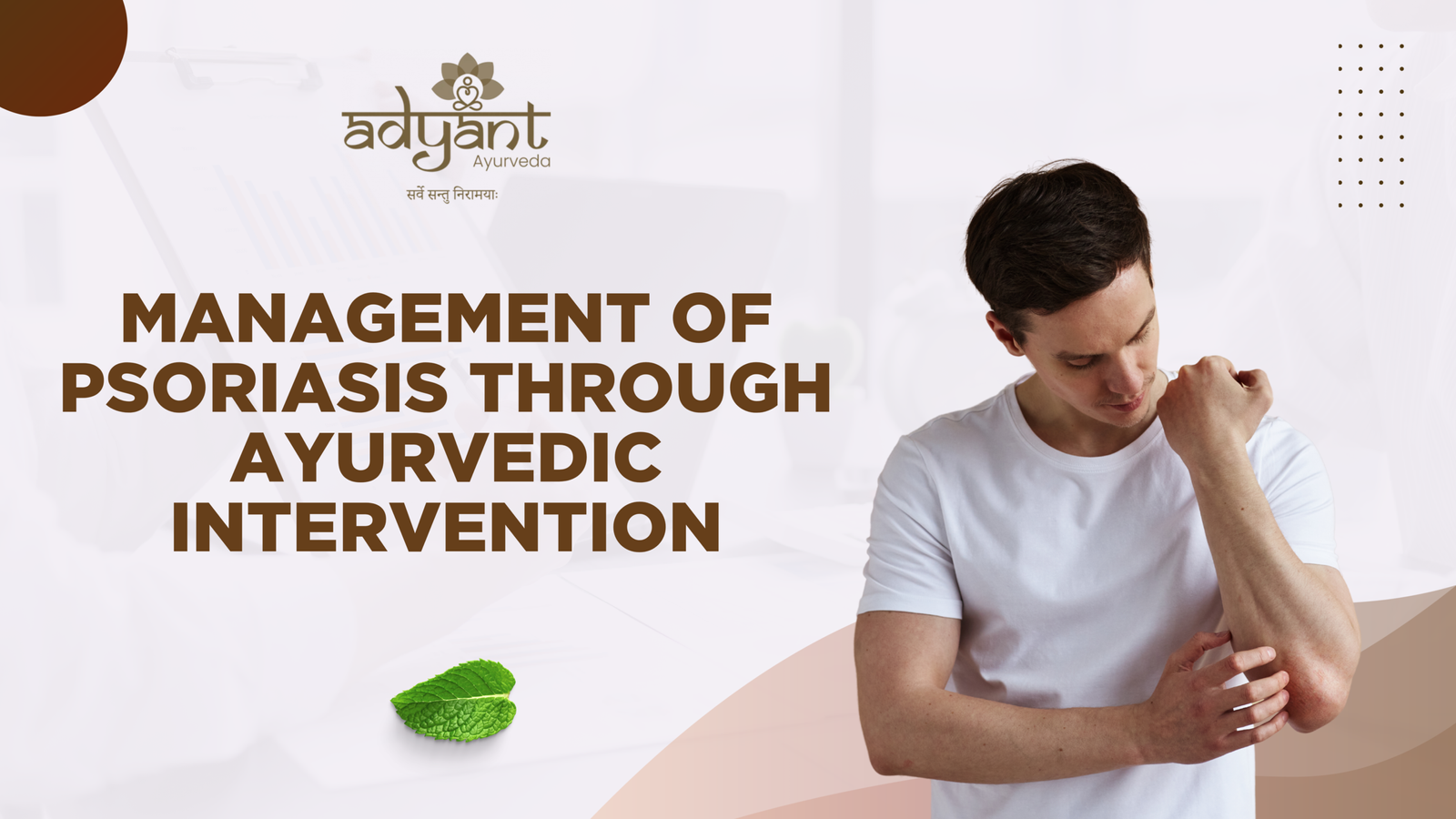Table of Contents
ToggleAyurvedic Treatment for Cholesterol (Dyslipidemia)
🌱 Introduction
Cholesterol imbalance, or Dyslipidemia, is a lifestyle-related disorder that increases the risk of cardiovascular diseases, fatty liver, pancreatitis, obesity, and metabolic syndrome. According to the ICMR-INDIAB study, hypercholesterolemia affects 13.9%, hypertriglyceridemia 29.5%, low HDL-C 72.3%, and high LDL-C 11.8% of individuals in India. Most cases are asymptomatic and detected only via routine lipid profiling.
In Ayurveda, this condition corresponds to Medoroga, arising from Medovaha Srotodushti (vitiation of fat tissue channels). It is a Santarpanajanya Vyadhi (disease of over-nourishment), primarily caused by improper diet, sedentary lifestyle, stress, and hereditary factors.
Shloka Reference:
“Aharat Punar Aharam Ahara Atimatra Vardhanam, Meda Vriddhih Kapha Pitta Samyogatah Santarpanajnam”
– Excessive heavy, oily, and sweet foods increase Meda and Kapha, leading to Medoroga.
🩺 Symptoms of Cholesterol Imbalance
Modern Symptoms
Mostly asymptomatic in early stages (detected via lipid profile)
Severe cases: chest pain, shortness of breath, xanthomas (fat deposits on skin, eyes, elbows, knees), fatigue, sluggishness
Ayurvedic Symptoms (Lakshanas of Medoroga)
Anga Gaurava – heaviness in the body
Atipipasa – excessive thirst
Swedadhikya – excessive sweating
Daurbalya – weakness
Alasya / Utsahahani – lethargy, lack of enthusiasm
Atikshudha – excessive hunger
Dourgandhya – foul body odor due to accumulated Ama
🛡️ Preventive Measures (Nidana Parivarjana)
Avoid Snigdha (oily), Guru (heavy), and Madhura (sweet) foods
Follow Dinacharya – early rising, timely meals, adequate sleep
Follow Ritucharya – seasonal lifestyle adaptations
Avoid divaswapa (daytime sleep) and ratri jagarana (late-night wakefulness)
Get regular lipid profile checks, especially with family history
Daily yoga, walking, or cycling to prevent Srotorodha (channel blockage)
🩺 Causes of Dyslipidemia/ Cholesterol
| Modern Causes | Ayurvedic Causes |
|---|---|
| High intake of fried, processed, and trans-fat foods | Snigdha, Guru, Madhura Ahara |
| Excess sugar, low-fiber diet | Atimatra Ahara, Adhyashana |
| Sedentary lifestyle | Avyayama |
| Obesity & metabolic syndrome | Santarpanajanya Vyadhi |
| Diabetes, hypothyroidism, kidney/liver disease | Mandagni → Ama formation |
| Excess alcohol, smoking | Vikrit Vihara |
| Steroids, contraceptives | Avarana (Kapha & Meda obstruction) |
| Genetic predisposition | Beeja Swabhavaja |
🔧 Ayurvedic Understanding of Cholesterol
Medo Dhatu nourishes body tissues; qualities: Snigdha (unctuous), Guru (heavy), Picchila (slimy), Mridu (soft)
Excess intake of oily, heavy, sweet foods + sedentary lifestyle → Meda accumulation in Tailavartika (abdomen)
Vitiated Kapha + Pitta + Mandagni → Ama formation → Srotorodha (blockage)
Manifestations: heaviness, obesity, abnormal lipid profile, early atherosclerosis, metabolic disturbances
Shloka Reference:
“Kapha Meda Samyogad Medorogasya Jananam, Divaswapam Adhyashanam Cha Hetu”
– Excess Kapha and Meda, day sleep, and overeating are primary causes of Medoroga.
🌱 Natural Tips to Reduce Cholesterol
Warm water with lemon & ginger daily
Garlic cloves (2–3, raw or sautéed)
Triphala at night with warm water
Flaxseeds (1 tbsp daily)
Include barley, green gram, legumes – Medohara foods
Use turmeric & black pepper in cooking
Daily exercise, yoga, and pranayama
Early bedtime; avoid daytime naps
Meditation to manage stress-induced lipid imbalance
⚖️ Ayurvedic Treatment Protocol
1. Shodhana (Bio-purification) – Virechana Karma/ Panchakarma treatment for Cholesterol
Purva Karma:
Rukshana: Dadimashtaka Churna
Snehapana: Triphala Ghrita (gradual dose)
Abhyanga & Swedana: Nirgundi Taila massage + herbal steam
Pradhana Karma:
Virechana Karma: Triphala, Trivrit, Kutaki, Aragwadh, Manuka, Eranda Sneha
Paschat Karma:
Samsarjana Krama: Gradual diet progression (Peya → Vilepi → Yusha → Khichdi)
Indicators of Success:
7–10 Vegas (bowel movements), lightness in body, clarity of senses
2. Shamana (Palliative Medicines – Best Ayurvedic Medicines for Cholesterol)
| Medicine | Properties | Key Actions |
|---|---|---|
| Arogyavardhini Vati | Deepana, Pachana | Improves digestion, detox |
| Kanchanar Guggulu | Lekhana, Kapha-Vatahara | Reduces fat and Kapha |
| Medohar Guggulu | Srotoshodhana | Metabolizes fats, lowers LDL |
| Dashamoola / Phaltrikadi Kwath | Tridoshahara | Balances doshas, removes toxins |
🌿 Effective Ayurvedic Herbs
| Herb | Properties | Key Actions |
|---|---|---|
| Mustaka | Deepana, Medohara | Improves digestion, reduces fat |
| Haritaki | Rasayana, Ama pachana | Detoxifies, boosts metabolism |
| Kutki | Lekhana, Hepatoprotective | Supports liver detox, fat breakdown |
| Arjuna | Hridya, Lekhana | Cardiotonic, lowers cholesterol |
| Punarnava | Mutral, Medohara | Reduces fluid retention and fat |
| Guggulu | Medohara, Lekhana | Helps metabolize fats |
| Amla | Rasayana, Hridya | Strengthens the heart, an antioxidant |
🍽️ Diet Recommendations
Pathya (Recommended):
Multigrain chapati (barley, wheat, green gram, chickpea)
Green leafy vegetables, garlic, ginger, buttermilk
Warm water, light dinners
Apathya (To Avoid):
Fried, processed foods, sweets, red meat, high-fat dairy
Daytime sleep, late-night meals
🏃 Lifestyle Recommendations
Exercise: 30 min walking, yoga, or cycling daily
Yoga Asanas: Surya Namaskar, Trikonasana, Pawanmuktasana
Pranayama: Kapalabhati, Anulom Vilom
Dinacharya: Wake up during Brahma Muhurta, avoid late nights
📈 Clinical Case Results
Case 1:
Cholesterol: 282 → 180 mg/dL
Triglycerides: 569 → 217 mg/dL
HDL: 30 → 40 mg/dL
BMI: 31.1 → 28.48
Weight: 83 → 76 kg
Case 2:
Hypercholesterolemia + hypothyroidism
Lipid panel normalized, TSH improved
Relief in heaviness, sweating, fatigue
🌟 Why Choose Adyant Ayurveda?
28+ years of expertise in Panchakarma & Ayurvedic lifestyle management
Five branches in Bangalore: Jayanagar, Indiranagar, Kalyan Nagar, Rajarajeshwari Nagar, Bannerghatta Road
Expert team:
Dr. Shree Lakshmi – Infertility & Lifestyle Disorders, 28 yrs experience
Dr. Vidya – Panchakarma & Dietetics, 19+ yrs experience
Dr. Preethi – Women’s Health & Detox, 22 yrs experience
Dr. Sumana – Skin Specialist & Panchakarma, 24 yrs experience
Dr. Apoorva – Holistic Lifestyle & Wellness
Dr. Bhagyalakshmi – Panchakarma Expert, 22 yrs experience
Specialized in lifestyle disorders: Dyslipidemia, Diabetes, Obesity, PCOD, Medoroga
Integrated Ayurvedic approach with Shodhana, Shamana, herbs, diet, yoga, and stress management
Safe, natural, and sustainable treatment under the supervision of qualified Ayurvedic physicians
✅ Conclusion
Ayurveda offers a holistic, safe, and sustainable approach to managing cholesterol. Treatments like Virechana Karma, Medohara herbs, dietary regulation, yoga, and pranayama not only normalize lipid levels but also correct digestion, remove Ama, clear channels, and restore dosha balance.
Combined with regular monitoring and lifestyle management, Ayurveda prevents complications like cardiovascular disease, fatty liver, diabetes, obesity, and PCOD, promoting long-term health and vitality.
Shloka Reference:
“Ayuh Svasthya Samyak Doshani Meda Hara Karma” – Proper lifestyle, diet, and detoxification lead to longevity and healthy fat metabolism.
⚠️ Medical Disclaimer
This content is for educational purposes only. Ayurvedic treatments should be administered under the supervision of a qualified Ayurvedic practitioner. Results vary based on individual dosha, health condition, and treatment adherence. Do not stop prescribed allopathic medicines without consulting your doctor.
👩⚕️ Author / Expert Review
Reviewed by senior Ayurvedic physicians at Adyant Ayurveda, Bangalore – a leading Ayurveda & Panchakarma center with 28+ years of expertise.
Expert Team:
Dr. Shree Lakshmi, Dr. Vidya, Dr. Preethi, Dr. Sumana, Dr. Apoorva, Dr. Bhagyalakshmi
📚 References
ICMR–INDIAB Study. (2014). Prevalence of dyslipidemia in India. Indian Journal of Endocrinology & Metabolism.
World Health Organization (WHO). (2023). Cardiovascular diseases fact sheet.
Singh RB, et al. (1990). Hypolipidemic and antioxidant effects of Commiphora mukul (Guggulu). Journal of Ethnopharmacology.
Tripathi KD. (2013). Essentials of Medical Pharmacology – Statins in lipid management.
Updated on 2025 September-25
FAQs
One of the best natural remedies for high cholesterol is incorporating a healthy diet and lifestyle changes. A diet rich in fiber, fruits, vegetables, whole grains, and healthy fats can help lower LDL (bad) cholesterol levels in the body. Additionally, regular exercise can improve cholesterol levels and promote overall heart health. Other natural remedies that have been shown to lower cholesterol levels include garlic, flaxseed, and fish oil supplements.
The question of whether cholesterol can be treated permanently is a common one. The answer lies in understanding that there are two types of cholesterol: high-density lipoprotein (HDL) and low-density lipoprotein (LDL). While LDL is often referred to as “bad” cholesterol, and HDL as “good” cholesterol, the truth is that both types play important roles in our bodies. So, while it’s not possible to completely eliminate cholesterol from our bodies, it is possible to manage it through lifestyle changes and medication. By adopting a healthy diet, exercising regularly, and taking prescribed medication, individuals can significantly reduce their cholesterol levels and live a healthier, more active life.
This is a common question asked by people who are looking for natural remedies to manage their cholesterol levels. One herb that has been proven to effectively lower cholesterol levels is garlic. Garlic contains compounds like allicin, ajoene, and alliin, that have been found to reduce LDL (bad) cholesterol levels and increase HDL (good) cholesterol levels. Studies have shown that taking garlic supplements or adding garlic to your daily diet can lower cholesterol by up to 10%. Garlic is a versatile herb that can be added to various dishes or taken in supplement form, making it an easy and effective way to manage cholesterol levels naturally
It’s a question that has been asked many times by people who prefer natural remedies for their health issues. Ayurveda, an ancient health system originating from India, offers a holistic approach to healing and balancing the body, mind, and spirit. According to Ayurvedic principles, high cholesterol is caused by an imbalance in the body’s Doshas (Vata, Pitta, Kapha) and can be treated by addressing the root cause of the problem. Ayurveda considers a combination of Panchakarma treatments, dietary changes, lifestyle modifications, and herbal remedies as an effective approach to lower cholesterol levels naturally.
Well, there is one beverage that has been shown to have a positive effect on cholesterol levels, and that is green tea. Green tea contains compounds called catechins, which have been found to reduce low-density lipoprotein (LDL) or “bad” cholesterol levels in the body. Along with green tea soya milk, oat drink, Tomato Juice, helps to reduce cholesterol . One more important thing that no one should consume this without consultation with doctor.
Cholesterol is a waxy, fat-like substance found in our blood. High levels of cholesterol in the blood can increase the risk of heart disease and stroke. Ayurvedic medicine offers several methods to control cholesterol levels. Along with Panchakarma treatments, One of the most effective ways to control cholesterol ayurvedic method is by making changes in your diet. Incorporating foods like turmeric, ginger, garlic, and omega-rich nuts like almonds and walnuts can help reduce cholesterol levels. Additionally, regular exercise, yoga, and meditation can help reduce stress, which is a significant contributor to high cholesterol levels. Ayurvedic herbs like Guggulu, arjuna, and ashwagandha can also be beneficial for maintaining healthy cholesterol levels. It is always best to consult with an Ayurvedic practitioner before trying any of these remedies to determine the most effective method for your individual needs
When it comes to managing high cholesterol levels, Ayurveda offers some of the best treatment options. Ayurvedic herbs such as guggulu, arjuna, and turmeric are known to effectively regulate lipid metabolism and lower cholesterol levels in the body. Apart from herbs, Ayurveda also recommends a wholesome diet and lifestyle modifications to reduce the risk of cardiovascular diseases. These therapies not only target the symptoms but also address the underlying causes of high cholesterol. Panchakarma Virechana treatment helps to improve metabolism , balance hormonal level, detoxify body, improve digestive fire. All this thing help to manage cholesterol levels. Panchakarma Virechanam plays vital role in Management of Cholesterol








